These three books are a mess! Here’s why:
Blood Meridian:
Brief Summary:
Stunning descriptions of unimaginable brutality, cruelty and suffering, followed by “He spat,” and then “They rode on.” Repeat, repeat, repeat, repeat. The End.
I have never read a book so bleak and murderous. It makes Lonesome Dove look like a kindergarten reader. But McCarthy’s descriptive ability is unparalleled; perhaps that’s the only redeeming quality. The Judge, who is the single survivor of this murderous tale, makes the only intellectual deposit for us to consider amidst all the bludgeoning, beheading and scalping. He is a Nietzschean blowhard who believes power, control, and most of all war are all that matter in life. Since he is 6’6” 320 pounds, stronger, smarter and more talented than anyone else, so it makes sense that he would hold this position.
But I have to ask, is strangling someone to death while you take a dump in an outhouse really a high water mark of existence? I’m sorry, Judge, you are no warrior sage come to enlighten, you are a wicked deviant, and the kid should have shot you when he had the chance; it would have shortened the book considerably, something I would have liked.
Colonialism: A Moral Reckoning
I remember reading somewhere that the only thing the British Empire was good for was the worldwide spread of the “F” word and soccer; other than that, it was a really bad idea that hurt a lot of people.
But is that true? Nigel Biggar doesn’t think so. So he wrote a book defending the British Empire. Can you do that? Wouldn’t that be like writing a book defending Darth Vader’s galactic empire? Aren’t empires, by definition, bad? What is an empire but the rich and powerful keeping the poor and weak under their thumb?
A LOT of people think Biggar is a moron for writing this book. In fact, I learned about it only after I heard that a speaking engagement of his was cancelled here in Vancouver, where I live, because of protests. This is a troublesome book indeed! But is Biggar on to something? Is a more nuanced understanding of the British Empire more in line with the truth, rather than simply “It's all bad?”
There was plenty of bad — Biggar doesn’t deny this, regularly throughout his book, he points out numerous instances where British rule was overbearing, disrespectful, unjust, racist, and murderous.
But there was also a lot of good. What bugs Biggar is the “Unscrupulous indifference to historical truth.” What about the Herculean effort to end slavery? What about all the investments in colonies which raised everyone's standard of living? What about the underlying humanitarian effort that stemmed from Christianity's desire to help the poor, feed the hungry, and free the captive? It was John Wesley who boomed from his pulpit, “Liberty is the right of every human creature, away with all whips, all chains, all compulsion.” He was one voice among thousands that inspired an army of people to travel the globe for all the right reasons. What about all the efforts to educate native populations, teaching them the ways of science and technology? What about the many British who fell in love with the cultures they inhabited and were instrumental in their preservation? What about the rule of law and the reduction of crime worldwide? Does the vision of eventual self-rule for the colonies count for nothing? What about the spread of democracy, the free press and religious liberty? How about the British Empire's willingness to self-criticize in order to improve? Can you imagine the Mongolian or Roman empires allowing themselves to be criticized?
So why all the bad press, if it wasn’t so bad? Biggar thinks a plot is afoot:
“The plan is to tear down the Anglo-American world order, which has prevailed since 1945…Denigrate the record, thus subverting self-confidence through exploiting guilt.”
But who is carrying out this plot, especially when so many anti-colonialist historians are white Europeans? To this little mystery, Biggar has only one shaky answer. According to him, one of Christianity's greatest drawbacks is a hypersensitivity to guilt. Christians often feel guilt when they shouldn’t. Biggar wants Westerners to knock off the guilt complex a little and restore pride in all the good that was accomplished through the empire. We can learn from the bad while at the same time celebrating the good.
What about Canada’s Residential Schools?
Since this topic comes up often in our part of the world, I was curious if Biggar had anything to say. He does.
In our anti-colonial climate, I have only ever seen racist comments attributed to John A Macdonald, Canada’s first prime minister. But that’s not the whole story, John seems to be for the native’s as well:
“We must remember that they are the original owners of the soil, of which they have been dispossessed by the covetousness or ambition of our ancestors..I hope to see some day the Indian race represented by one of themselves on the floor of the House of Commons.”
As for the schools themselves, Biggar wants more nuance. He wants us to understand that they were well-meaning, only that poor planning and a lack of funding, without proper oversight, led to horrible abuse in many cases. To be sure, there were lots of problems, however:
Indigenous leaders lobbied for residential schools. He quotes Chief Paulus Claus of the Mohawk who said, “We cannot be a people unless we conform ourselves to the ways of the white man.”
Residential school was entirely voluntary until 1894 and generally voluntary until 1920
It was not a universally negative experience for the estimated 150 thousand who went (only 1/3 of native children), but positive perspectives are systematically rebuffed or ignored.
The rhetoric of “genocide“ and the discovery of “mass graves” are very misleading. The language links residential schools with such atrocities as the Gulag, Nazi concentration camps or the killing fields of Cambodia, which is not at all the case.
I couldn’t help but think that Biggar is not wrong on some of his points. That said, Empires become empires not because they are nice to people. Maybe thanks to Biggar's hard work, we could conclude that as far as empires go, the British one was the best. But that may or may not be saying much. As the American empire lustily eyes our Canadian land, I wonder, will we get swallowed up? There would be nothing we could do to prevent it. It would be empires doing what empires do, I guess, but that’s not good news for me. I love Canada the way it is, just like many of the indigenous populations would have been thinking before the British showed up.
The World In A Grain
This might be one of the worst titles going. A book about sand is already going to be coming out of the gates late. The status of sand in our world is hardly a scintillating topic for most of us.
How about:
Sinking Sands
Nothing Left in the Hourglass,
Sand Crisis: Humanities Undoing
Vanishing Beaches, Sinking Islands, and the Greatest Theft of all Time
Something to grab a potential reader’s attention. What did grab my attention, however, was the content. We have a bit of a sand problem. Here it is in a nutshell. Sand is used to make just about everything, it seems. Concrete, cement, asphalt, glass, computer chips, even the elastic band on your underwear. Human populations are booming, and everyone lives in cities now. Cities are made of sand. Here is the cruel twist. Desert sand is no good for construction. So the sand we build with has to come from river beds, beaches and ocean bottoms. The need makes for greed, and as supplies diminish, islands disappear, whole beaches are stripped down to nothing, farmland gets scalped, and ocean floors along with their coral reefs get demolished. There is a sand mafia now, people are getting killed over those little annoyances you feel in your sandal on your way home from the beach!
Solution:
Someone needs to figure out how to use desert sand — solve this mystery, and this book becomes the yawner the title makes it out to be.





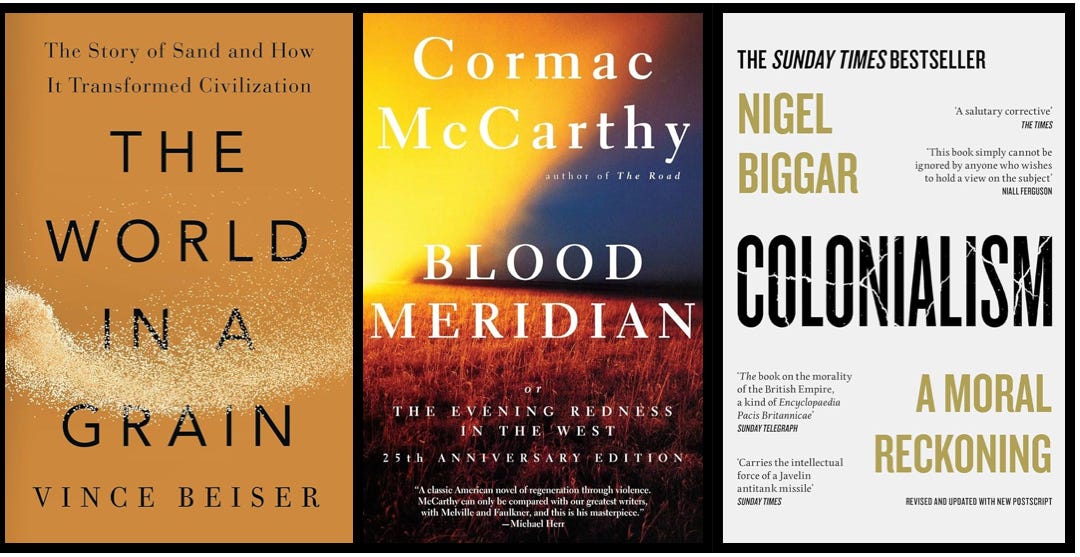
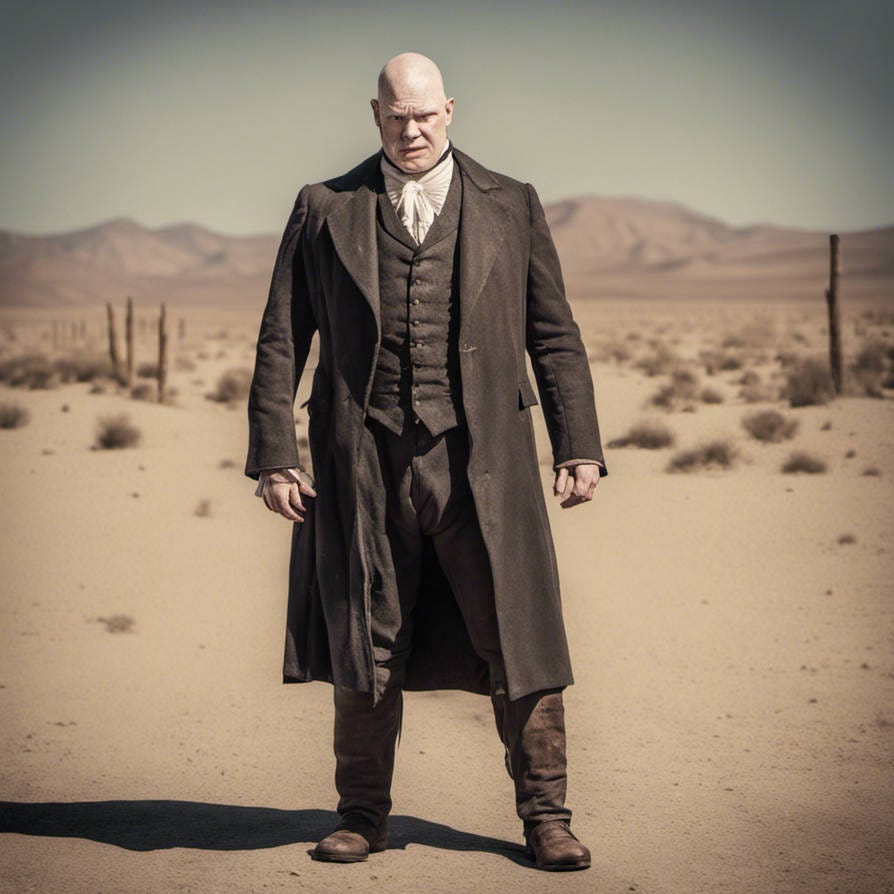
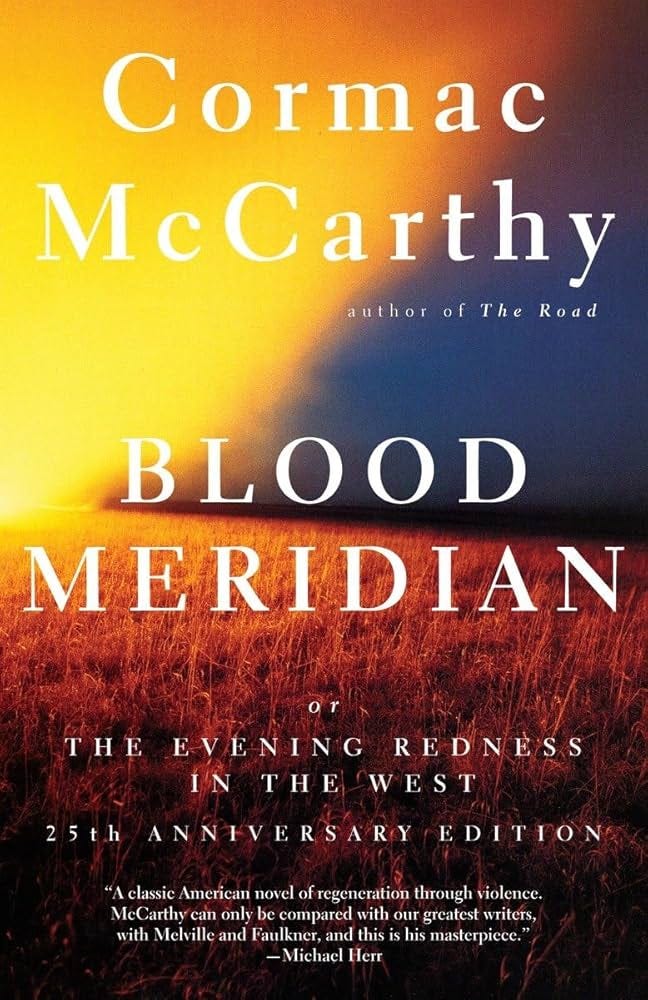
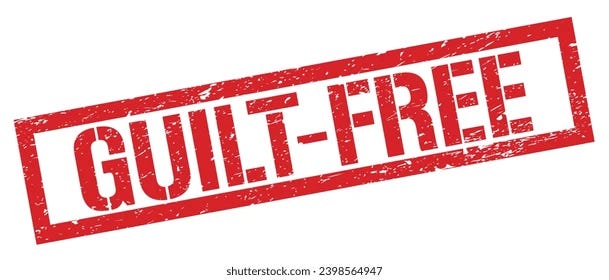
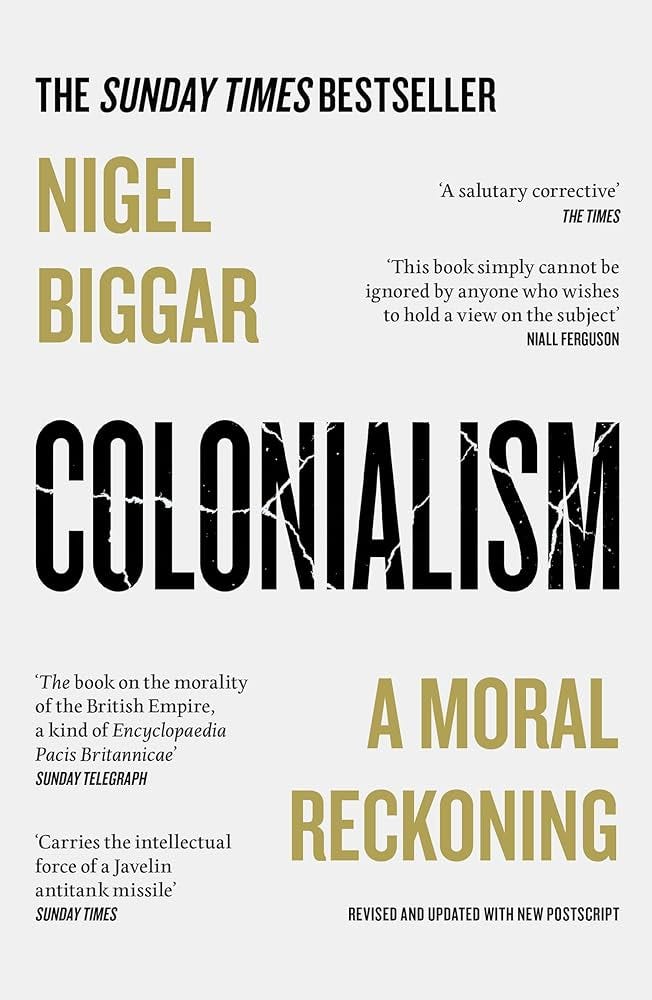
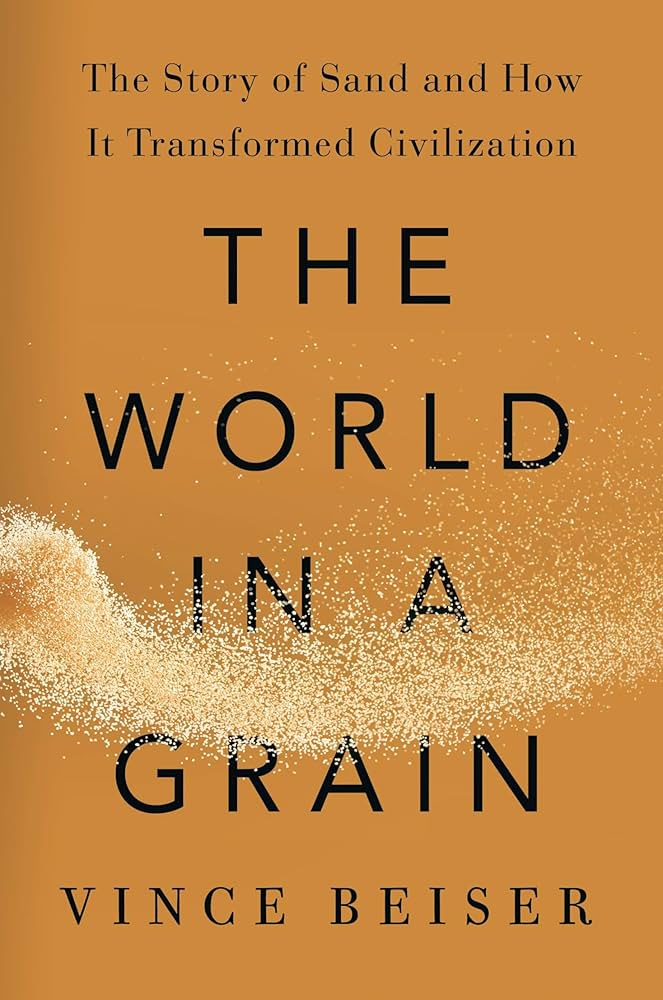
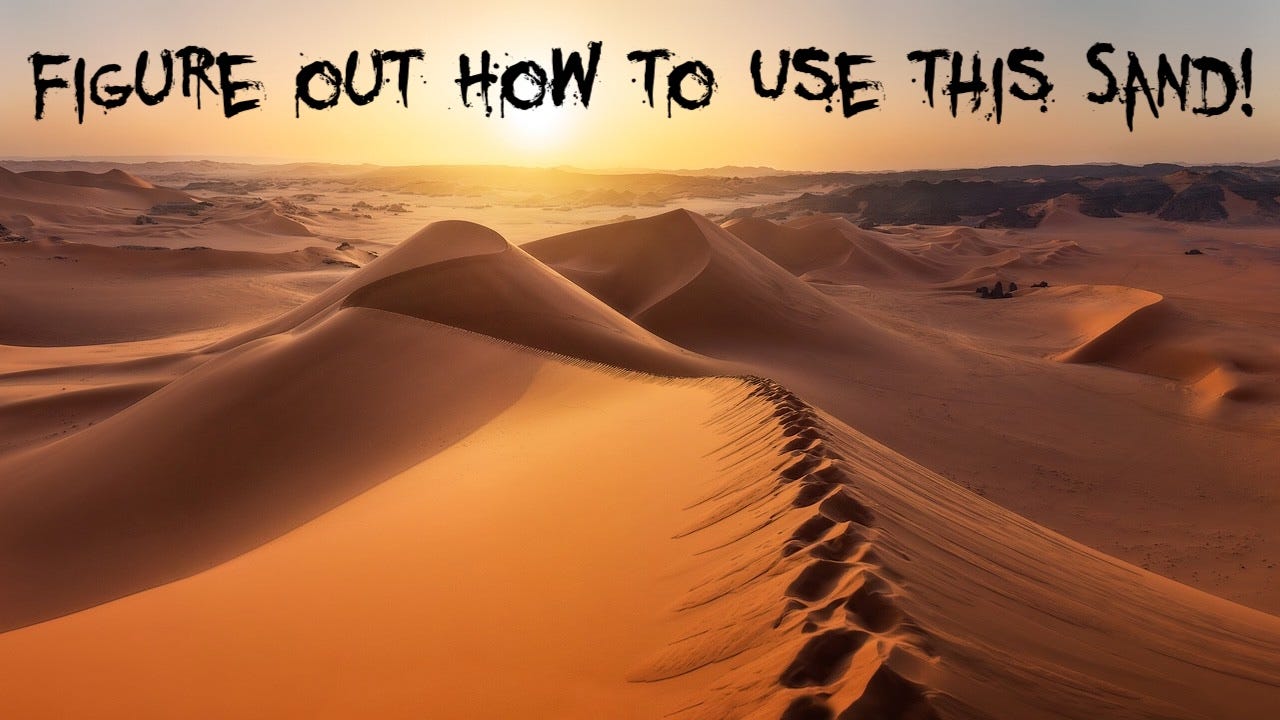
Says me in response to my friend Christopher Mark:
Well now that you put it that way….
I was struck by the writing for sure. In so many ways poetic and beautiful. I was compelled to finish it
However, The book had no one to love, no one to cheer for, no one to hope in. No struggle between good and evil, no redemption. It was a super sized meal of brutality and evil — I could never like that. I like little dogs. It sucks that the captain bought a couple of pups just to kill them. It no good that they are on the hunt for scalps, its awful that the Judge takes a surviving boy in one of the massacres only to kill him a few days later after he did God knows what with him. yes, the judge makes a very good Satan and he permeates the gang so that they destroy others and themselves, but how am I supposed to like that? — its relentless evil, I don't like that, I hate that. I suppose I could learn of the wickedness of Satan, so long as he gets his ass handed to him in the end. But that's not what happens. This is no story — its a long black turd slowly descending into a rusty stinking toilet. (hows that for a visual?)
McCarthy‘s words paint such vivid pictures. I can still see black Jackson cutting the head off of white Jackson and the ribbons of blood flowing upward
— but I don't really want my imagination overwhelmed with such darkness. Especially when in the end it seems to win.
thank you very much for interacting with my review. One day, I hope lots of people will interact like you have done above
Hope to see you again in Vancouver soon!
Says my friend Christopher Mark:
Ah I think you’re missing lots on Blood Meridian.
It is a portrayal, often based on historical events, of the violence and depravity of the west. But more!
First, the Judge is one of the greatest portrayals of the devil in all of literature. Certainly the greatest modern portrayal of Satan. And my opinion the most terrible villain in all of literature.
“He was close on to seven feet in height and he stood smoking a cigar even in this nomadic house of God and he seemed to have removed his hat only to chase the rain from it for now he put it on again.” He teaches the gang to make gunpowder (a nod to Satan in Paradise Lost). His goal is to become teh ruler of all of the earth.
“Look at the birds of the air, for they neither sow nor reap nor gather into barns; yet your heavenly Father feeds them. Are you not of more value than they?” but the Judge says “the freedom of birds is an insult to me. I would have them all in zoos.”
The very ending itself (and I won’t post spoilers here) is unknowable. What happens in the embrace of such evil?
The Kid could stand in for all of mankind “He can neither read nor write but in him broods already a taste for mindless violence. All history present in that visage, the child the father of the man.” A penchant towards violence and sin, courted by the devil.
And you see other characters, like Toadvine and Brown, who can’t escape their fate having made a bargain - toadvine in his hat. But the Judge offers food and water in the desert and what is the Kids answer? What does that echo?
"Weigh your counsel, priest. We are all here together. Yonder sun is like the eye of god..."
"I am no priest, and I have no counsel. The lad here is a free agent."
and
"Hear me, man. I spoke in the desert for you, and you only, and you turned a deaf ear to me. If war is not holy, then man is nothing more then antic clay."
There is something being said in the Kids refusal to kill the Judge. Turns from violence and war. As the Judge says after he dances "there is room on stage for one beast and one beast alone. All others are destined for a night that is eternal and without name. One by one they they will step down into the darkness before the footlamps."
And it is more - a comment on man freed from restraint. Man gone mad with freedom.
And the writing is so beautiful:
““They rode on and the sun in the east flushed pale streaks of light and then a deeper run of color like blood seeping up in sudden reaches flaring planewise and where the earth drained up into the sky at the edge of creation the top of the sun rose out of nothing like the head of a great red phallus until it cleared the unseen rim and sat squat and pulsing and malevolent behind them. The shadows of the smallest stones lay like pencil lines across the sand and the shapes of the men and their mounts advanced elongate before them like strands of the night from which they’d ridden, like tentacles to bind them to the darkness yet to come.”